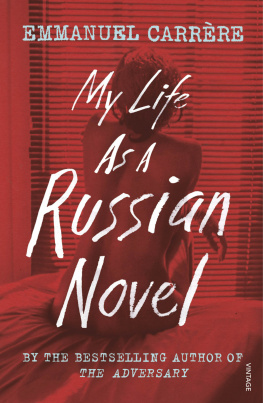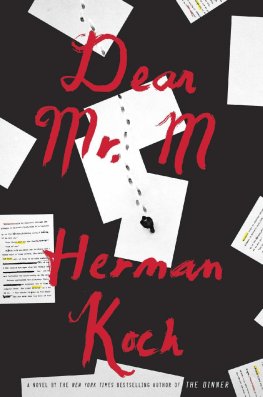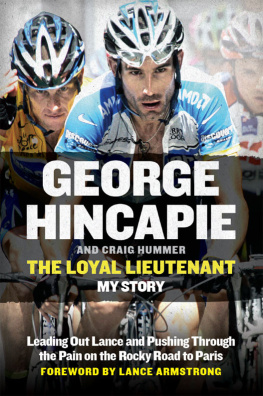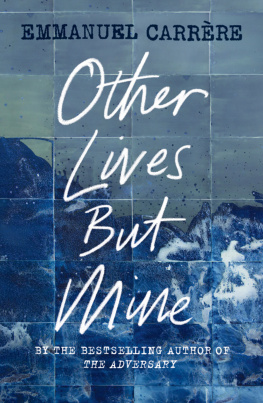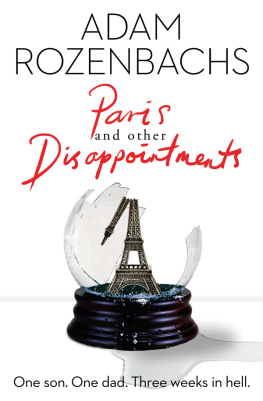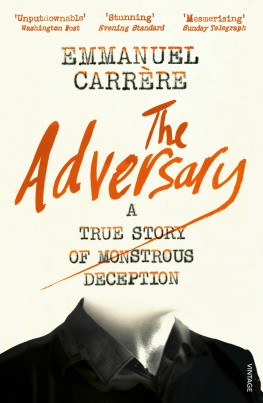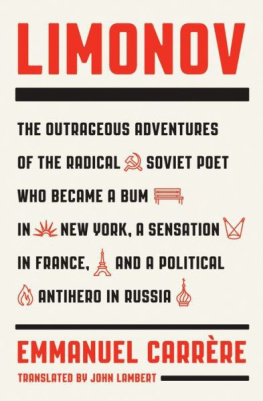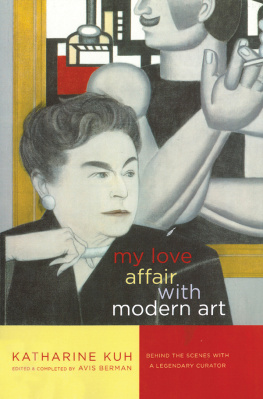CONTENTS
ABOUT THE BOOK
In this non-fiction novel road trip, confession, and erotic tour de force Emmanuel Carrre pursues two consuming obsessions: the disappearance of his grandfather amid suspicions that he was a Nazi collaborator in the Second World War; and a violently passionate affair with a woman that he loves but which ends in destruction. Moving between Paris and Kotelnich, a grisly post-Soviet town, Carrre weaves his story into a travelogue of a journey inwards, travelling fearlessly into the depths of his tortured psyche.
ABOUT THE AUTHOR
Emmanuel Carrre, novelist, filmmaker, journalist, and biographer, is the award-winning internationally renowned author of The Adversary (a Sunday Times bestseller and New York Times Notable Book, translated into twenty-three languages), Lives Other Than My Own, My Life as a Russian Novel, Class Trip, Limonov (winner of the 2011 Prix Renaudot), The Mustache and, most recently, The Kingdom.
ALSO BY EMMANUEL CARRRE
The Mustache
Gothic Romance
Class Trip
The Adversary
I am Alive and You Are Dead
Lives Other Than My Own
Limonov
The Kingdom
1
The train is humming along, its nighttime, Sophie and I are making love in the berth and it really is her. In my erotic dreams, my partners are usually several women at once and difficult to identify, but this time, no: I recognize Sophies voice, her words, her spread legs. In the sleeping car compartment where we have so far been alone, another couple turns up, the Fujimoris. Mme Fujimori hops right into bed with us. The entente is immediately cordiale, with much merriment. Supported by Sophie in an acrobatic position, I enter Mme Fujimori, who soon comes ecstatically. M. Fujimori now announces that the train has stopped. Its sitting in a station and has been there for perhaps some time. Motionless in the glare of the sodium lights, a policeman is watching us. Convinced that hes about to get on the train to reprimand us, we hastily close the curtains, then rush to tidy up the compartment and put our clothes back on so well be ready, when he opens the door, to assure him blithely that he hadnt seen a thing, that hed been dreaming. We imagine his suspicious, disappointed face. All this takes place in an exciting blend of panic and helpless giggling. I do point out, however, that theres nothing to laugh about: we might get arrested, hauled off to the police station while the train goes on its way, at which point God knows what will happen. Vanishing without a trace in this muddy back of beyond, well die in some dungeon deep in the Russian heartland with no one to hear our screams. My warnings send Sophie and Mme Fujimori into fresh gales of mirth and I end up laughing with them.
The train has stopped, as in my dream, at a deserted but brightly lit platform. It is three in the morning, somewhere between Moscow and Kotelnich. I have an achy head and parched throattoo much to drink at the restaurant before going to the station. Taking care not to wake Jean-Marie, stretched out in the other berth, I make my way among the crates of equipment cluttering the compartment and out into the corridor in search of a bottle of water. The dining car where we sluiced down our last vodkas a few hours ago is closed, the only illumination a single dim light at each table. Four soldiers, having planned ahead, are continuing to get plastered. As I go by they offer me a drink; I decline and, walking on, I recognize Sasha, our interpreter, sprawled on a banquette, snoring sonorously. I sit down a bit farther away, calculate the time differencemidnight in Paris, still okayand try to call Sophie on my cell phone to tell her about this dream that seems to me extraordinarily promising. When I cant get through, I take out my notebook instead and write it down.
Wherever did M. and Mme Fujimori come from? Thats not hard to figure out. Fujimori is the name of the former president of Peru, the subject of an article I skimmed on the plane. The corruption scandals that turned him out of office didnt interest me much, but an article on the facing page caught my eye. It was about missing people in Japan whose families are convinced theyve been kidnapped and held secretly in North Korea, some for as long as thirty years. No recent event had triggered the article, no demonstration organized by the families, no anniversary, no new development in the case, closed ages ago, if indeed it had ever been opened. It isnt clear at all why the article appeared yesterday rather than some other day, this year rather than some other year; perhaps the journalist had run into a few peoplein the street, in a barwhose relatives had simply vanished back in the seventies. To bear up under the torment of uncertainty, families had come up with the kidnapping story and then, much later, told it to a stranger, who was now telling it to the world. Was it plausible? Was there any evidenceif not proofto support the claim, or at least a likely explanation? If I had been the newspaper editor, I would have asked the journalist to dig a little deeper. But no, he simply reported that some Japanese families believed their relatives had disappeared into prison camps in North Korea. Dead or alive, who could say? Dead, most likely, of hunger or beatings by their jailers. And if alive, they probably no longer at all resembled the young men and women who vanished thirty years ago. If they were ever found, what would one say to them? And they, what would they say? Should one even want to find them?
The train sets out again, through forests. No snow. The four soldiers have finally gone off to bed. Theres no one left in the dining car, with its flickering table lamps, but Sasha and me. At one point, Sasha bestirs himself, sits halfway up. His big rumpled head appears suddenly above the backrest of his banquette. Seeing me at the table writing, he frowns. I gesture soothingly in his direction, as if to say, Go back to sleep, theres plenty of time, and down he goes again, doubtless certain hes been dreaming.
When I was a foreign aid worker in Indonesia twenty-five years ago, travelers used to pass around terrifying and mostly true stories about the prisons stuffed with people whod been caught with drugs. In the bars of Bali, there was always some bearded guy in a sleeveless T-shirt going on and on about how hed survived a close call that had left a less fortunate buddy serving 150 years of slow death in Bangkok or Kuala Lumpur. One evening after wed been carrying on this way for hours with jaunty nonchalance, some guy I didnt know trotted out another story, perhaps true, perhaps not. This was back when the Soviet Union was still around. When you take the Trans-Siberian Railway, he explained, youre strictly forbidden to get off along the route, to stop at a station to do some sightseeing, for example, and then get on the next train. Well, it seems that in certain backwater towns, near the railroad tracks, you can find exceptionally hallucinogenic mushrooms (or really cheap rare carpets, jewelry, precious metals, whatever), so sometimes travelers dare to ignore the rule. The train stops for three minutes in a little station in Siberia. Bitter cold, no town, just a bunch of huts, a sinister mud hole that looks abandoned. Without anyones noticing, the adventurer gets off the train, which departs. Alone, he shoulders his pack and leaves the stationa platform of rotting planksto flounder through muck and puddles, past wooden fences and barbed wire, wondering if the whole thing was such a good idea. The first person he meets is some sort of degenerate who, in a cloud of appallingly bad breath, delivers a speech in which all nuance is lost (the traveler knows only a few words of Russian, which might not even be what the wretch is speaking), but the gist is clear: he cant go wandering around like that, hell get himself picked up by the police.

